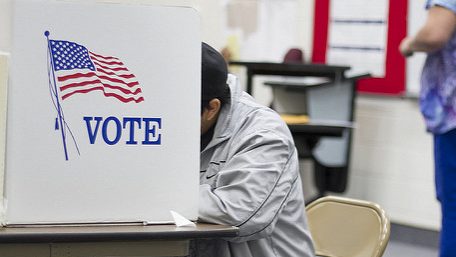Political analyst says Michigan Latino voters ‘could potentially decide the state’
Michelle Jokisch Polo September 5, 2024Erick Gonzalez Jeunke, who specializes in Latinx politics at MSU, says the state’s 400,000 eligible Latinos voters could help determine who wins Michigan if the presidential race is close enough.

As polls and political pundits work to predict the still evolving presidential race, an expert in Michigan says if the vote is close, one group “could potentially decide the state.”
Erick Gonzalez Jeunke is a political analyst specializing in Latinx politics at Michigan State University. In an interview with the Michigan Public Radio Network, he said the state’s 400,000 eligible Latinos voters could hold the key to winning in Michigan, if the campaigns reach out to them.
Listen: Political analyst says Michigan Latino voters ‘could potentially decide the state’
This interview has been edited for clarity and length.
Michelle Jokisch Polo, WKAR News: In 2020 Joe Biden won the presidential election in Michigan by fewer than 200,000 votes. With more than 300,000 eligible Latino voters in Michigan, this group could prove vital in the state. How are parties engaging this voting bloc?
Erick Gonzalez Jeunke: I haven’t seen a lot of engagement for specifically this voting block. What that means is what they should have been doing and what I haven’t seen a lot of, but a lot of this happens behind the scenes, obviously, are registration drives. One of the gaps for Latino voters nationally, and then of course here in Michigan, is not just turning out to vote, but being registered to vote. A large part of that gap — about 70% of eligible voters — are even registered to vote. And so that’s part of the big gap. I mean, this is one of the lingering things, if you account for that, once you just look at registered voters, Latinos turn out at about the same rates as other groups, but the gap is really in getting individuals registered to vote. So that requires a lot of work, that requires the parties caring about these voters. Now when we get into this part of the season, a lot of the parties both nationally and here in Michigan, either leave that up to other groups, or they say, ‘look, we have limited resources. We can’t go out and mobilize people who aren’t registered.’ So a lot of that work takes place in the years and months that lead up to these elections.
MJP: This time around, it seems that there may have been fewer young democrats showing up to vote like they did in 2020, in the state primary election. Why do you think this is and tell us about the young Latino vote in November?
EGJ: I think it’s probably due to a not very competitive set of federal races, and then earlier in the year, a not very competitive presidential primary. But it’s also just an enthusiasm gap. We’re right in the middle of seeing this change with the change at the top of the ticket from Biden to Harris. I was just looking at some national polling data today, and what’s happening here in the Midwest and in Michigan is that Harris has seemed to have activated — particularly younger voters’ — enthusiasm about this race. So paying attention, getting excited, and that excitement turns into actual voting. It can turn into knocking on doors. It can turn into working for the campaign. So it’s still a little bit early to see what the overall effect of this is, but the early signs indicate that a change at the top of the ticket may reverse some of this lack of enthusiasm that we saw in the primaries, and particularly for younger Latinos.
MJP: How important do you think the Latino voting bloc is for the state’s general election?
EGJ: It depends how close the race is. It could potentially decide the state, and yet that depends on if the parties do the work to mobilize and get Latinos who aren’t registered, registered to get folks to turn out. So unfortunately, we won’t know until after the election. And it comes down to how close is Michigan actually going to be? It’s looking a lot less close than it did a month ago. But things could change, and we could go back to a really close race, if I had to put money on it right now, that it’s probably not going to be as close as we thought it was a month ago. But if it’s close, the Latino vote could be really, really important, and the Democratic and Republican parties could say, ‘boy, we really should have done more work to mobilize Latino voters in Michigan, because we could have taken it.’ And I think both parties would say the same thing about Pennsylvania andWisconsin.
Use the media player above to hear the full interview with Erick Gonzalez Jeunke, political analyst specializing in Latinx politics at Michigan State University.
Trusted, accurate, up-to-date.
WDET strives to make our journalism accessible to everyone. As a public media institution, we maintain our journalistic integrity through independent support from readers like you. If you value WDET as your source of news, music and conversation, please make a gift today.
Author
-
As WKAR's Bilingual Latinx Stories Reporter, Michelle reports in both English and Spanish on stories affecting Michigan's Latinx community. Michelle is also the voice of WKAR's weekend news programs. Michelle joined WKAR in August 2020. Before joining WKAR, Michelle was the inclusion reporter at WGVU Public Media, covering stories of people at the intersections of racial justice immigration reform, criminal justice system reform, reproductive justice and trans and queer liberation. Michelle began her career as a journalist as the head reporter at El Vocero Hispano, the largest Hispanic newspaper in Michigan. Michelle has a master's degree from Grand Valley State University and a bachelor's degree from Calvin University.
